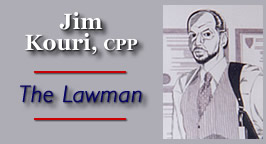Other
Kouri
Articles:
Battle at The Border: The War Few Discuss in Washington
Illegal Alien Killers, Rapists and Robbers
ARUBA: A DRUG TRAFFICKER'S PARADISE
Jim
Kouri, CPP
August 11, 2005
NewsWithViews.com
Located only 20 miles off the coast of Venezuela, the island paradise of Aruba serves as a trans-shipment point for illicit drugs�primarily cocaine from South America. Smugglers generally move large loads of cocaine into Aruba on fishing vessels, private yachts, and go-fast boats. They also move drugs out of Aruba inside maritime containerized cargo and airfreight. Drug trafficking organizations continue to exploit Aruba's air and sea links to the continental United States, South America, Europe, Puerto Rico, and other Caribbean nations. Most of the cocaine transiting Aruba is destined for European markets�primarily the Netherlands.
Aruba has large free-zone facilities (areas that allow goods to be held and then re-shipped elsewhere without paying an import or duty tax), which provide opportunities for bulk shipments of cocaine to transit the area without the scrutiny of local officials. Cocaine shipments in containerized cargo increasingly are transiting the area, specifically through the free zone. The free-zone facilities on Aruba are conducive to transshipments, not only of drugs, but also chemicals used in illicit manufacture of drugs. Some firms in the free zone are suspected of involvement in money laundering.
Couriers on commercial flights and cruise ships smuggle small (usually from 1- to 10-kilogram) amounts of cocaine and, to a lesser extent, heroin, into and out of Aruba, either concealed in their luggage or taped to their bodies. Commercial air couriers, sometimes swallow up to 1 kilogram of cocaine or heroin per trip. Drug couriers easily blend into the hundreds of thousands of tourists who visit Aruba each year.
The proximity of Aruba to South America, a high standard of living in Aruba, and an underdeveloped law enforcement infrastructure make the country an attractive meeting place for South American, European, and U.S. drug traffickers. Colombian traffickers play a major role in the shipments of cocaine and heroin that transit the island, having forged trafficking relationships with local Arubans. In the past, some airline employees and cruise-ship personnel have smuggled drugs through Aruba.
Aruba plays a significant role as an offshore center for drug-related money laundering. Money laundering organizations are well established on Aruba and enjoy protection from considerable bank secrecy laws and a stable currency. The organizations use Aruba's offshore banking and incorporation systems, free-zone areas, and resort/casino complexes to transfer and to launder drug proceeds. Although money laundering was made illegal in 1999, the legislation requires a provable underlying crime with a penalty of at least 4 years. The Government of Aruba also has an asset-seizure law that allows for seizure at the time of arrest to prevent criminals from moving assets prior to conviction.
The Government of Aruba has recently issued several decrees on money laundering that include increased oversight of casinos and insurance companies. The Government of Aruba also is in the process of instituting reporting requirements for cross-border currency movements in excess of 20,000 Aruban florins (approximately US$11,200). Aruba has a Financial Intelligence Unit (FIU), known as the Meldpunt Ongebruikelijke Transacties (MOT), and is a member of the Egmont Group, an international group of FIUs.
Aruba is not a source country for any of the chemicals used in illicit drug production and has no specific legislation controlling essential chemicals. Difficulties abound when attempting to gauge the levels of chemical transshipment through Aruba, as most chemicals legally pass through Aruba's Free Trade Zone�an area in which local law enforcement has limited oversight due to local regulations and manpower shortages. The reporting of chemicals transiting the island is strictly voluntary.
The Aruba Organized Crime Unit, a small investigative team of the Aruba Police, or Politie, has responsibility for investigating large-scale drug trafficking crimes. The Coast Guard of the Netherlands Antilles and Aruba (CGNAA) is responsible for maritime drug interdictions around Aruba and the Netherlands Antilles. The Governments of the Netherlands Antilles and Aruba have agreed to work more closely with the other coast guards operating in the region in order to present a united front against drug trafficking. The CGNAA has its own Criminal Intelligence Division (CID) which is separate from the Politie. However, due to Dutch law, unless the CGNAA can demonstrate that a given vessel is either coming from or going to territorial waters of the Netherlands Antilles or Aruba, any drug law enforcement, other than an administrative boarding, is considered illegal. Dutch investigators also support law enforcement investigations in the Netherlands Antilles.
Cocaine, heroin, and marijuana are readily available in Aruba. Wholesale amounts of cocaine sell for from US$3,800 to US$4,500 per kilogram among drug traffickers; heroin sells for about US$23,000 per kilogram; and marijuana sells for about US$2,000 per kilogram. These low prices suggest a heavy flow of drugs into Aruba. According to Aruban statistics, an estimated 14 percent of Arubans regularly use illicit drugs.
|
Subscribe to the NewsWithViews Daily News Alerts! |
Aruba serves as one of two forward operating locations (FOLs) in the Caribbean for U.S. counterdrug aircraft. The FOL, located at Queen Beatrix Airport near Oranjestad, provides a landing and servicing area for counterdrug detection and monitoring missions in the region. The United States and Aruba do not have a formal maritime law enforcement agreement.
Sources:
Central Intelligence Agency, Drug Enforcement Administration, National Security Institute
� 2005 Jim Kouri- All
Rights Reserved
Jim Kouri, CPP is currently fifth vice-president of the National Association of Chiefs of Police. He's former chief at a New York City housing project in Washington Heights nicknamed "Crack City" by reporters covering the drug war in the 1980s. He's also served on the National Drug Task Force and trained police and security officers throughout the country.
He writes for many police and crime magazines including Chief of Police, Police Times, The Narc Officer, Campus Law Enforcement Journal, and others. He's appeared as on-air commentator for over 100 TV and radio news and talk shows including Oprah, McLaughlin Report, CNN Headline News, MTV, Fox News, etc. His book Assume The Position is available at Amazon.Com, Booksamillion.com, and can be ordered at local bookstores.
E-Mail: COPmagazine@aol.com
Aruba plays a significant role as an offshore center for drug-related money laundering. Money laundering organizations are well established on Aruba and enjoy protection from considerable bank secrecy laws and a stable currency.










